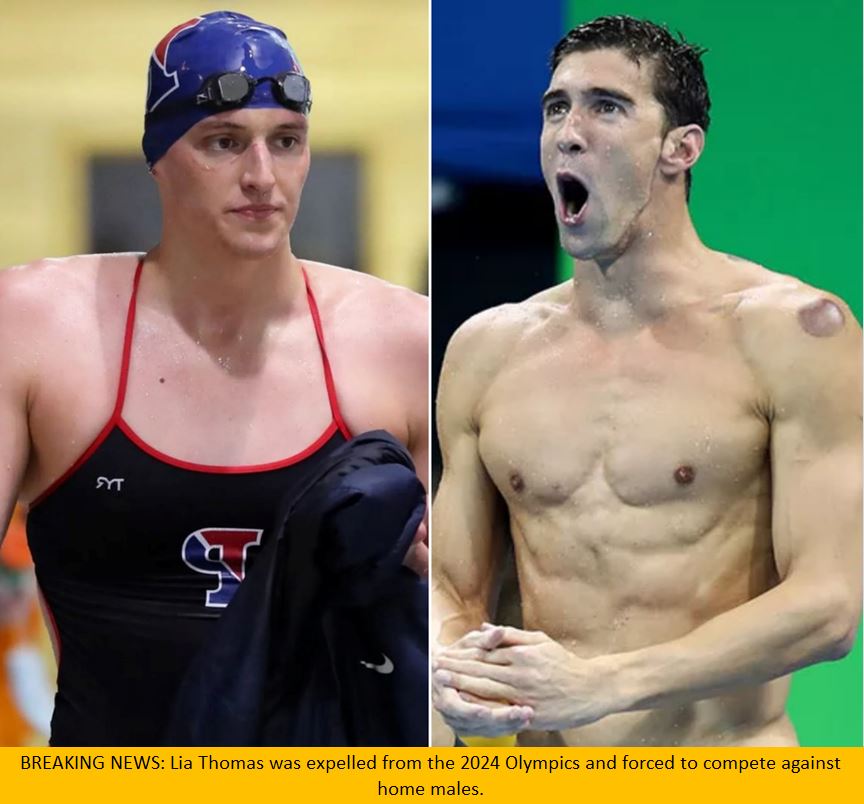
In a controversial and highly debated decision, transgender swimmer Lia Thomas has been expelled from the 2024 Paris Olympics, a move that has sparked intense discussions around fairness, inclusion, and the evolving dynamics of competitive sports. The announcement sent shockwaves through the sports community, with many questioning the implications for gender inclusion in elite athletic competition.
The Controversy Surrounding Lia Thomas
Lia Thomas, a former University of Pennsylvania swimmer, made history in 2022 as the first openly transgender athlete to win an NCAA Division I title in women’s swimming. Her achievements became a point of contention for many in the sports world, particularly regarding her eligibility to compete in women’s categories. Some critics argued that her participation created an unfair advantage due to her biological advantages from male puberty, while others defended her right to compete, pointing out the importance of inclusion for transgender athletes in sports.
As a result, Lia Thomas found herself at the center of one of the most heated debates in the sports community regarding the participation of transgender athletes in gender-segregated events. Her case exemplified the broader challenges and tensions between athletic fairness and inclusion for transgender individuals in sports.
The Decision to Expel Thomas from the 2024 Olympics
The decision to expel Lia Thomas from the 2024 Paris Olympics came after an international swimming body (FINA) enforced stricter eligibility rules for transgender athletes. Under the new guidelines, transgender women are now required to prove that their testosterone levels have been below a certain threshold for an extended period before they can compete in women’s events. These updated regulations were adopted after a lengthy debate and scrutiny over Thomas’s performances and eligibility in women’s events.
Thomas, whose testosterone levels were within the allowed range for previous competitions, did not meet the newly revised criteria set by FINA. As a result, she was disqualified from competing in the women’s category in the upcoming Olympic Games, a decision that many in the transgender community view as discriminatory.
Public Backlash and Support for Thomas
The expulsion of Lia Thomas has ignited widespread debate, with polarized opinions across the sports and political spectrum. Supporters of Thomas, as well as many LGBTQ+ advocates, argue that the new rules are a direct attack on transgender athletes and that Thomas, like other athletes, should be able to compete based on her gender identity and years of rigorous training.
Many of Thomas’s supporters also argue that the Olympic Games and professional sports should evolve in ways that embrace gender diversity and allow athletes to compete based on their gender identity. For these advocates, Thomas’s expulsion represents a setback in the fight for transgender rights and inclusion in sports.
On the other hand, critics contend that the updated eligibility rules are necessary to ensure fairness in women’s sports, which they believe are at risk of being dominated by athletes who, due to their biological advantages, can outperform cisgender women. Some have argued that these new regulations help level the playing field and preserve the integrity of women’s athletics.
The Next Chapter: Competing Against Male Athletes
In the aftermath of her disqualification, Lia Thomas has been left with limited options for future competition. While she is no longer eligible to compete in the women’s events at the Olympics, Thomas has been allowed to compete in men’s categories, as the rules governing transgender athletes in men’s sports have been less restrictive. However, this creates a difficult situation for Thomas, who may face significant challenges and unfair comparisons when competing against male swimmers.
Some supporters of Thomas see her being relegated to competing against men as an unjust outcome, one that disregards her identity and athletic achievements. Others believe that Thomas should continue to fight for her place in women’s sports, despite the setbacks.
A Landmark Moment in the Discussion of Transgender Athletes in Sports
Lia Thomas’s journey in competitive sports, from her groundbreaking achievements to her expulsion from the 2024 Olympics, has brought critical attention to the evolving rules and policies surrounding transgender athletes. It raises difficult questions about how sports organizations can create fair and inclusive environments for athletes of all genders, while still maintaining the competitive integrity of women’s sports.
As the conversation continues, it remains to be seen how these new policies will affect transgender athletes in the future. Thomas’s experience is only one chapter in an ongoing debate, but it has certainly highlighted the need for more dialogue, understanding, and collaboration between governing bodies, athletes, and advocates for both fairness and inclusivity.
Conclusion: The Future of Transgender Athletes in Sports
Lia Thomas’s expulsion from the 2024 Olympics represents a turning point in the debate over transgender athletes’ participation in sports. Whether viewed as a fair decision based on biological considerations or a step backward for inclusion and rights, her case underscores the need for continued dialogue and policy development in the world of competitive athletics.
As the world moves toward the Paris Olympics and beyond, it is clear that the conversation surrounding transgender athletes will continue to evolve. What is certain, however, is that the experience of athletes like Lia Thomas will continue to challenge the norms of sports and spark ongoing discussions about fairness, inclusion, and the future of competitive athletics.
Leave a Reply